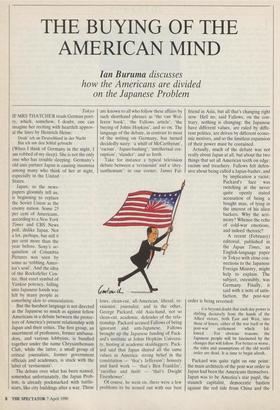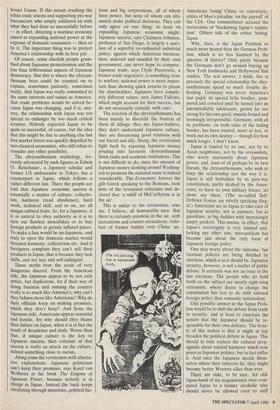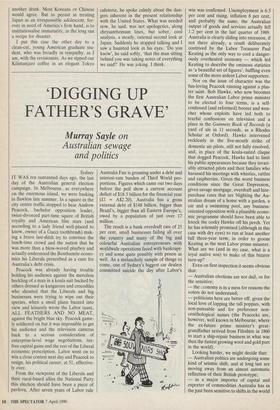THE BUYING OF THE AMERICAN MIND
Ian Buruma discusses
how the Americans are divided on the Japanese Problem
Tokyo IF MRS THATCHER reads German poet- ry, which, somehow, I doubt, one can imagine her reciting with heartfelt approv- al the lines by Heinrich Heine:
Denk' ich an Deutschland in der Nacht Bin ich um den Schlaf gebracht
(When I think of Germany in the night, I am robbed of my sleep). She is not the only one who has trouble sleeping. Germany's old axis partner Japan is causing insomnia among many who think of her at night, especially in the United States.
Japan, so the news- papers gloomily tell us, is beginning to replace the Soviet Union as the enemy nation. Some 25 per cent of Americans, according to a New York Times and CBS News poll, dislike Japan. Not a lot, perhaps, but still 6 per cent more than the year before. Sony's ac- quisition of Columbia Pictures was seen by some as 'robbing Amer- ica's soul'. And the idea of the Rockefeller Cen- ter, that erect symbol of Yankee potency, falling into Japanese hands was felt by many people as something akin to emasculation.
But the harshest language is not directed at the Japanese so much as against fellow Americans in a debate between the protec- tors of America's present relationship with Japan and their critics. The first group, an assortment of professors, former ambassa- dors, and various lobbyists, is bundled together under the name Chrysanthemum Club, while the latter, a small group of critical journalists, former government officials and academics, is stuck with the label of 'revisionists'.
The debate over what has been named, somewhat unfortunately, the Japan Prob- lem, is already pockmarked with battle- scars, like city buildings after a war. These
are known to all who follow these affairs by such shorthand phrases as 'the van Wol- feren book', 'the Fallows article', 'the buying of Johns Hopkins', and so on. The language of the debate, in contrast to most of the writing on Germany, has turned decidedly nasty: 'a whiff of McCarthyism', 'racism', 'Japan-bashing', 'intellectual cor- ruption', 'slander', and so forth.
Take for instance a typical television debate between a 'revisionist' and a 'chry- santhemum': in one corner, James Fal- lows, clean-cut, all-American, liberal, re- visionist, journalist, and in the other, George Packard, old Asia-hand, not so clean-cut, academic, defender of the rela- tionship. Packard accused Fallows of being ignorant and anti-Japanese. Fallows brought up the Japanese funding of Pack- ard's institute at Johns Hopkins Universi- ty, hinting at academic skulduggery. Pack- ard said that Japan shared all the same values as America: strong belief in the constitution — 'that's Jefferson'; honesty and hard work — 'that's Ben Franklin'; 'sacrifice and thrift — 'that's Dwight Eisenhower'.
Of course, he went on, there were a few problems to be ironed out with our best friend in Asia, but all that's changing right now. Hell no, said Fallows, on the con- trary, nothing is changing: the Japanese have different values, are ruled by diffe- rent politics, are driven by different econo- mic motives, and so the limitless expansion of their power must be contained.
Actually, much of the debate was not really about Japan at all, but about the two things that set all American teeth on edge: racism and treachery. Fallows felt defen- sive about being called a Japan-basher, and by implication a racist; Packard's face was twitching at the never quite openly stated accusation of being a bought man, of lying in the interest of his alien backers. Why the acri- mony? Whence the echo of cold-war emotions, and indeed rhetoric?
A recent (February) editorial, published in the Japan Times, an English-language paper in Tokyo with close con- nections to the Japanese Foreign Ministry, might help to explain. The subject, ostensibly, was Germany. Finally, it said with a note of satis- faction, the post-war order is being reversed:
. . . it is beyond doubt that each day power is shifting decisively from the hands of the Allied victors, both East and West, into those of losers, either of the war itself or the post-war settlement which fol- lowed. . . . For obvious reasons, the Japanese people will be fascinated by the changes that will follow. For better or worse, the rules and assumptions of the old world order are dead. It is time to begin afresh.
Packard was quite right on one point: the main architects of the post-war order in Japan had been the Americans themselves. Japan was to be America's star pupil, the staunch capitalist, democratic bastion against the red tide from China and the Soviet Union. If this meant crushing the leftist trade unions and supporting pre-war bureaucrats who simply soldiered on with what they had done so successfully before — in effect, directing a wartime economy aimed at expanding national power at the expense of domestic consumers — then so be it. The important thing was to protect America's relationship with its best pal.
Of course, some churlish people grum- bled about Japanese protectionism and the less than Jeffersonian aspects of Japanese democracy. But this is where the chrysan- themum boys could be counted on to explain, sometimes patiently, sometimes testily, that Japan was really committed to the same interests and values as America, that trade problems would be solved be- cause Japan was changing, and t1-.at, any- way, the relationship with Japan was too special to endanger by too much critical scrutiny. Nobody expected Japan to be quite so successful, of course, but the idea that this might be due to anything else but free market forces was quickly dispelled by neo-classical economists, who still refuse to consider any other possibility.
The chrysanthemum mythology, fer- vently advocated by such figures as Edwin 0. Reischauer, a Japanese scholar and former US ambassador in Tokyo, has a counterpart in Japan, which follows a rather different line. There the people are told that Japanese economic success is essentially a matter of culture: collectiv- ism, harmony (read obedience), hard work, technical skill, and so on, are all unique cultural traits. So, for a Japanese, it is as natural to obey authority as it is to turn out flawless motorbikes or to buy foreign products at grossly inflated prices. To make a fuss would be un-Japanese, and truly to open the domestic market would threaten harmony, collectivism etc. And if foreigners complain they can't sell their products in Japan, that is because they lack skills, and are lazy and self-indulgent.
These myths bear the seeds of very dangerous discord. From the American side, the Japanese appear to be not only unfair, but duplicitous, for if their way of doing business and running the country really is so much like America's, why can't they behave more like Americans? Why do their officials keep on making promises, which they don't keep? And from the Japanese side, Americans appear resentful and hostile, for why should they blame their failure on Japan, when it is in fact the result of decadence and sloth. Worse than that, if unique culture is the key to Japanese success, then criticism of that success is really an attack on the culture, indeed something close to racism.
Along come the revisionists with alterna- tive explanations. Japanese politicians can't keep their promises, says Karel van Wolferen in his book The Enigma of Japanese Power, because nobody is in charge in Japan. Instead the buck keeps circulating through ministries, political fac- tions and big corporations, all of whom have power, but none of whom can ulti- mately make political decisions. They can only agree on one thing: to keep on expanding Japanese economic might. Japanese success, says Chalmers Johnson, professor at San Diego, is largely a ques- tion of a superbly co-ordinated industrial policy, against which American business- men, unloved and unaided by their own government, can never hope to compete. Japanese trade, says Clyde Prestowitz, a former trade negotiator, is something close to warfare; national power is more impor- tant than showing quick returns to please the shareholders. Japanese have comple- tely different values, says James Fallows, which might account for their success, but do not necessarily coincide with ours.
The reaction of the chrysanthemums has been mainly to discredit the bearers of these ill tidings: they are Japan-bashers, they don't understand Japanese culture, they are threatening good relations with our friend and ally. Stung, the revisionists fight back by exposing Japanese money pouring into favourite chrysanthemum think-tanks and academic institutions. This is not difficult to do, since the amount of Japanese money sloshing around Washing- ton to promote the national cause is indeed considerable. The Economist, forever the glib Greek speaking to the Romans, took note of the revisionist criticisms and de- clared that 'a whiff of McCarthyism is in the air'.
This is unfair to the revisionists, who are, I believe, all honourable men. But there is certainly paranoia in the air, with accusations and counter-accusations, redo- lent of former battles over China: un- Americans 'losing' China, or, conversely, critics of Mao's paradise 'on the payroll' of the CIA. One commentator accused the revisionists of 'blackening Japan's reputa- tion'. Others talk of the critics 'hating' Japan.
Why, then, is the Japan Problem so much more heated than the German Prob- lem, which is no less haunted by the spectres of history? Only partly because the Germans don't go around buying up New York landmarks and Hollywood film studios. The real answer, I think, lies in precisely the special relationship the chry- santhemums spend so much trouble de- fending. Germany was never America's star pupil, its special little brother, pam- pered and cosseted until he turned into an uncontrollable adolescent, grown far too strong for his own good, muscle-bound and seemingly irresponsible. Germany, with all its problems, on both sides of the fading border, has been trusted, more or less, to work out its own destiny — though for how much longer, I don't know.
Japan is trusted by no one; not by its Asian neighbours, not by the revisionists, who worry incessantly about Japanese power, and, least of all perhaps by its best friends, the chrysanthemums, who wish to keep the relationship just the way it is. Japan is still forbidden by its post-war constitution, partly drafted by the Amer- icans, to have its own military forces, let alone use them. (The so-called Self- Defence Forces are strictly speaking illeg- al.) Americans are in Japan to take care of Japanese security, not as partners, but as guardians, as big daddies with increasingly empty pockets. This means, in effect, that Japan's sovereignty is very limited and, lacking any other aim, mercantilism has become just about the only form of Japanese foreign policy.
One may worry about the outcome, but German policies are being decided by elections, which is as it should be. Japanese security, however, is not a matter of public debate. It certainly was not an issue in the last elections. The people who do hold forth on the subject are mostly right-wing extremists, whose desire to change the constitution has less to do with rational foreign policy than romantic nationalism.
One possible answer to the Japan Prob- lem would be to shift the debate from trade to security, and at least to entertain the notion that the Japanese should be re- sponsible for their own defence. The beau- ty of this notion is that it might at last broaden the political debate in Japan. This should in time replace the cultural prop- aganda about natural harmony which now poses as Japanese politics, but in fact stifles it. And once the Japanese decide them- selves where their interests lie, they might become better Western allies than ever.
There are risks, to be sure. An old- Japan-hand of my acquaintance once com- pared Japan to a former alcoholic who should never be allowed even to sniff another drink. Most Koreans or Chinese would agree. But to persist in treating Japan as an irresponsible adolescent, for- ever in need of America's firm hand, is to institutionalise immaturity, in the long run a recipe for disaster.
I put this case the other day to a clean-cut, young American graduate stu- dent, who was broadly in sympathy, as I am, with the revisionists. As we sipped our Kilimanjaro coffee in an elegant Tokyo cafeteria, he spoke calmly about the dan- gers inherent in the present relationship with the United States. What was needed now, he said, was not apologetics, along chrysanthemum lines, but sober, cool analysis, a steady, rational second look at Japan. Suddenly he stopped talking and I saw a haunted look in his eyes. 'Do you know', he said softly, 'that the man sitting behind you was taking notes of everything we said?' He was joking. I think.




























































 Previous page
Previous page